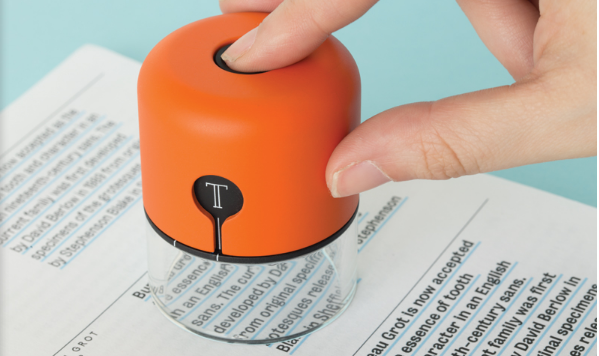Spector is a tool that helps bridge the gap between designing on digital screen and the finalized print. It is a hand-held device allowing various print materials to become interactive. Fiona O’Leary came up with a idea idea for her graduation project at the Royal College of Art.
Spector:
Found a typeface you like? Wonder how big it is? Spector tells you straight away and changes the type live on screen. Wonder what shade of green that leaf is? It also detects colors and gives specific CYMK, RGB or Pantone values. Spector connects to the computer via Bluetooth and has a software interface that shows what colours and type you have collected.
O’Leary describes Spector as a “physical eyedropper.” We like to think of it as Shazam for colors. Or maybe a Poké Ball for fonts. But we digress. Here’s how it works: Place Spector over a piece of media and depress the button on top. A camera inside photographs the sample, and an algorithm translates the image into information about the shape of the typeface, or the color’s CMYK/RGB values. Spector beams that information to a font or color database, which IDs the sample. If your computer is nearby, a custom plugin ports the font or color information to InDesign, where highlighted text or projects will automatically change to the typeface or color of your real-world sample. No computer? No problem. Spector can store up to 20 font samples, so you can transfer them to your computer later.
When you place Spector on a printed page of type or colour and click the button. This is then sent to the computer and then is communicated to a program such as InDesign, Pages and Word via plugin where there is live text present. The text is then changed to the printed font instantaneously while being able to view information about the font such as size, kerning, leading and where to buy it. Colours are loaded into the swatch palette.
MIMO:
Mimo is a physical device that allows the user to perform multiple ‘copy and paste’s on their computer. The product consists of 4 physical switches that each represent a clipboard (a clipboard is a temporary storage area where material copied from a file is kept for pasting into another file). The user swipes up to copy and swipes down to paste.
The tool is connected to a computer via Bluetooth and has a software application that replicates the physical interface showing what has been copied. Copying something not only copies, but also stores a copy of the data (be it a link, image or file) on the physical device, thus also making it a bookmark and a storage space (hard drive) for copied data in which nothing is overwritten.
There is no information about when they start selling this products. Stay Tuned!
